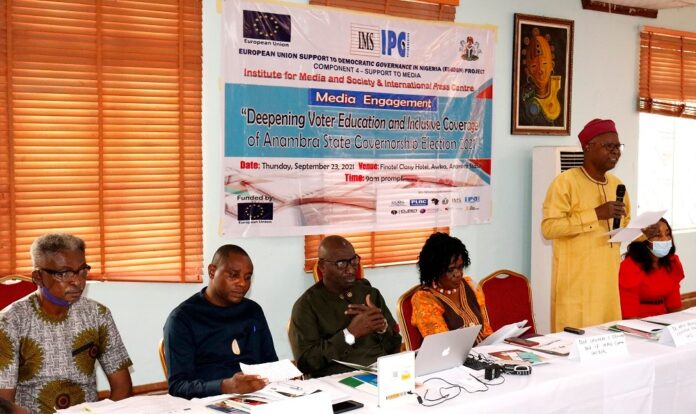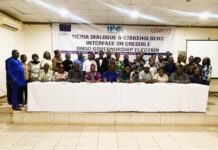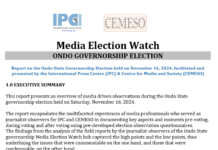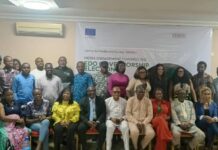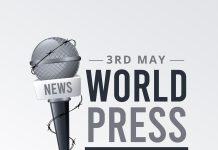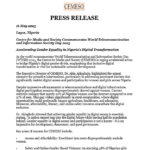The Institute for Media and Society (IMS) and the International Press Centre (IPC), implementing partners of Component 4, Support to Media, under the European Union Support to Democratic Governance in Nigeria (EU-SDGN) Project, organised a one-day media engagement ahead of the Anambra State governorship election.
The event, was held between 9.0am and 5.00pm on Thursday September 23, 2021 at Finotel Classy Hotel, Awka, with the theme: ‘Towards Professional and Inclusive Reporting of the 2021 Anambra State Governorship Election.‛
The activity was attended by about 50 media stakeholders from the broadcast, print and online media and the academia from Anambra State and neighbouring states. Also in attendance were heads of media industry groups such as the Nigeria Union of Journalists (NUJ), the Nigeria Association of Women Journalists, and the Radio, Television, Theatre and Arts Workers’ Union of Nigeria (RATTAWU) respectively.
The event was chaired by Prof. Stella Okunna, the first female Professor of Mass Communication in Nigeria and former Dean of the Faculty of Social Sciences, Nnamdi Azikiwe University (UNIZIK), Awka.
The opening remarks were made by Dr Akin Akingbulu, Executive Director of Institute for Media and Society (IMS) and Mr Lanre Arogundade, Executive Director, International Press Centre (IPC) while goodwill remarks were delivered by Mr. Francis Ekpone, Acting Chairman, Anambra State NUJ; Mrs. Franklyn Onyekachi, Chairperson, Anambra State NAWOJ and Mr Andy Onwuahe, Chairman, Anambra State RATTAWU, respectively.
The media engagement, which was a combination of capacity building, information sharing and interactive segments, consisted of five sessions.
The first session had two presentations under two sub-themes, ‘Understanding and using the Nigerian Media Code of Election Coverage’, by Mr Arogundade of IPC and ‘Issues from statutory regulatory oversight’ by Dr. Akingbulu of IMS.
The second session, which was on inclusion in elections, featured Zoom presentations by Mr Jake Epelle, President, The Albino Foundation, who spoke on ‘disability inclusion issues’ as well as Mrs. Miriam Menkiti, Executive Director, Women Information Network (WINET) who spoke on ‘Women in Politics’. The session also had a complementing presentation by Mrs. Franklyn Onyekachi of NAWOJ on ‘gender inclusion and inclusive reporting’.
The third session saw Dr Akingbulu dealing with ‚Observations and lessons from Media Content Monitoring in Recent Elections in Nigeria through a power point presentation while Mr. Sanmi Falobi, Programme Manager of IPC dealt with ‘findings from IPC print/online media monitoring’.
The fourth session, entitled ‘Dealing with fake news and fact checking in Anambra elections’ was handled by Mr. Arogundade via a power point presentation.
The fifth session was a plenary/interactive session on ‘professional media coverage and deepening voter education in the Anambra State election’ which dovetailed into the final session featuring questions and general comments.
OBSERVATIONS:
During the media engagement, participants made the following key observations:
1. A plural and vibrant media landscape exists in Anambra State, with potential to handle professional coverage of the governorship election.
2. The outcome of media content monitoring across the country in recent national elections which indicate inadequate attention to the issues of women, persons with disability (PWDs) and rural areas, makes inclusion an area of concern on the coverage of the electoral process.
3. The atmosphere in Anambra State ahead the election remains relatively peaceful. However, in view of past experiences on the conflictual nature of the campaign and election day phases of the electoral cycle in Nigeria, there must be high readiness for stakeholders, including the media, to carry out appropriate roles to deal with the potentials for violence.
4. The incidence of fake news and hate speech has constituted a challenge in relevant elections and political communication in general. It will be important to note and deal with these twin demons in the coming Anambra election.
The election management body, INEC, has reported challenges to its facilities in the recent past and addressing these challenges is imperative.
RECOMMENDATIONS: To the Media:
Journalists covering the Anambra governorship election should:
1. Provide balanced, accurate, issue-based coverage free from fixation on personalities
2. Provide equitable access to all political parties and candidates
3. Ensure inclusivity through deliberate steps to include women, PWDs and other under-reported sections of the population
4. Give quality attention to the rural areas and not only concentrate around the urban areas
5. Manage reports and other content to keep out fake news and hate speech
6. Ensure they are properly accredited by INEC and have their accreditation tag visibly displayed at all times.
7. Be safety conscious and not put themselves in harm’s way. They should show needed courtesy and caution when dealing with armed security personnel so there is no undue aggression
8. Be adequately equipped for the task by having resource materials such as the Nigeria Media Code of Election Coverage, Gender-Sensitive Media Guidelines and the Broadcasting Code.
To Security Agencies
Security agencies should:
1. Ensure a level-playing ground for all parties, ensure safety and protection of properties and lives of all citizens
2. Ensure that journalists are able to move round and discharge their duties before, during and after the election.
3. See journalists as stakeholders in the electoral process and so ensure that journalists are not hindered or harassed during coverage of the governorship election
To INEC
The Independent National Electoral Commission should:
1. Ensure the process of conducting a free, fair and credible election is not disrupted
2. Ensure hitch free participation of women, youth and especially, PWDs, in the electoral process.
TO CSOs
1. CSOs should play their oversight roles such as observation and reporting.
2. Along with others, CSOs should also prioritise attention to voter education in the run-up to the election.
APPRECIATIONS:
The participants expressed appreciation to the EU-SDGN for supporting the programme and gratitude to IMS and IPC for organizing the media engagement for journalists in Anambra State.
Signed:
Dr. Akin Akingbulu Lanre Arogundade
Executive Director, IMS Executive Director, IPC


